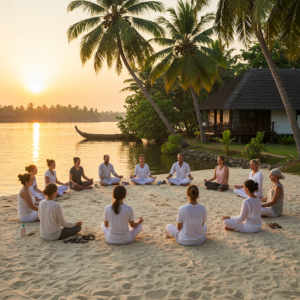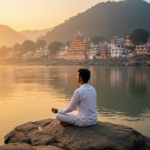
the essence of the Kerala retreat.
A Sanctuary in Spice Country: Finding Transformation in Kerala
Imagine the gentle caress of humid air, thick with the intoxicating aroma of spices, carrying the distant sounds of chanting and the rhythmic crash of waves. This is the sensory tapestry that awaits in Kerala, India, a land often whispered about as a haven for those seeking solace and a deeper connection with themselves. For those yearning to escape the relentless pace of modern life and embark on a journey inward, Kerala presents an idyllic backdrop, its very essence resonating with centuries of spiritual tradition. Within this verdant landscape, nestled amidst the natural beauty that has earned it the moniker “God’s Own Country,” lies the promise of profound personal evolution. This review delves into the heart of such an opportunity: the “10-Day Transformative Ashram Yoga, Meditation, and Advaita Vedanta Retreat,” an invitation to immerse oneself in ancient practices and philosophies, potentially leading to a lasting shift in perspective and well-being.
The Mystical Allure of Kerala: A Land Steeped in Spirituality
Kerala’s reputation as a spiritual sanctuary is no accident; it is deeply woven into the fabric of its history and culture. For centuries, this southwestern state of India has been a melting pot of diverse religious traditions, coexisting in remarkable harmony. Ancient temples dedicated to Hindu deities stand alongside historic mosques, some of the oldest in India, and churches with roots stretching back to the early centuries of Christianity. Even a Jewish legacy can be traced within its vibrant cultural landscape. This long history of religious tolerance suggests an environment that is inherently open and welcoming to spiritual seekers, regardless of their background or beliefs.
The very air in Kerala seems to hum with a spiritual energy, nurtured by the presence of numerous ashrams and temples that dot the landscape, offering spaces for contemplation and practice. The cultural expressions of Kerala, from the intricate dance form of Kathakali to the graceful movements of Mohiniyattam, often draw inspiration from spiritual narratives and traditions, indicating how deeply intertwined the sacred is with the everyday life of the region. Furthermore, the numerous festivals and rituals that punctuate the Keralan calendar are not merely social gatherings; they are imbued with spiritual significance, reflecting a deep connection to the divine and the cyclical rhythms of nature. The lush landscapes, from the tranquil backwaters to the majestic Western Ghats, further enhance this spiritual atmosphere, offering a sense of peace and serenity that naturally encourages introspection and a connection to something larger than oneself. The nickname “God’s Own Country,” while evocative, truly captures the essence of a land where the pursuit of spiritual understanding feels both natural and deeply ingrained.
Arriving at the Ashram: Embracing Simplicity and Serenity
The journey to Amritapuri Ashram, the location for this transformative retreat, is likely to involve a transition from the familiar comforts of everyday life to a space intentionally designed to foster inner exploration. It is important to approach this experience with the understanding that the focus here is on spiritual practice and personal growth, rather than the opulent amenities one might expect from a typical vacation. The ashram’s atmosphere is immediately palpable – a sense of simplicity, a pervasive quietude that encourages introspection, and an underlying current of dedication to spiritual principles.
Accommodation at Amritapuri is described as simple and essential, a deliberate choice to minimize distractions and support a state of mindfulness. Guests typically share a double room located near the Kali Temple, each equipped with a private bathroom, while also having access to shared facilities within the ashram. This minimalist approach to living quarters underscores the retreat’s philosophy: that true transformation often arises when external comforts take a backseat to inner work. The proximity of the accommodation to the Kali Temple is noteworthy, suggesting a readily available spiritual energy and the opportunity to easily participate in devotional practices, which form an integral part of the ashram’s daily life. This setting encourages a deep immersion into the ashram’s rhythm and a connection with a community dedicated to spiritual pursuits.
The Gentle Rhythm of Ashram Life: A Day of Practice and Reflection
The daily schedule at the 10-Day Transformative Ashram Retreat is structured to create a harmonious balance between various spiritual disciplines, following the natural rhythms of ashram life. The day begins before dawn, at 4:50 AM, with the chanting of Lalita Sahasranama (Archana), a devotional practice that sets a sacred tone for the hours ahead. This early start signifies a commitment to prioritizing spiritual activities and aligning oneself with the natural cycles of the day.
Following the chanting, participants engage in meditation or yoga with Zaira from 6:30 to 7:30 AM, incorporating breathing techniques and awareness-based movements. This practice serves to awaken the body and mind, preparing them for deeper states of contemplation. Breakfast follows at 8:30 AM, providing nourishment before a period of personal time or relaxation for reflection or reading until 11:00 AM. This allocated time allows for the integration of the morning’s practices and the opportunity for individual contemplation. Mid-morning, from 11:00 AM to 12:00 PM, offers a unique experience: yoga on the beach or in a nearby park, connecting the physical practice with the natural beauty of Kerala and incorporating both postures and Advaitic teachings. Lunch is served at 12:30 PM, after which the afternoon is dedicated to self-inquiry and the teachings of Advaita Vedanta. This includes a dedicated personal time from 2:00 to 4:30 PM for journaling, rest, contemplation, or reading scriptures, fostering a deeper engagement with the philosophical aspects of the retreat. From 4:30 to 6:30 PM, participants gather for teachings and discussions with Zaira, exploring the principles of non-duality, self-awareness, and Indian wisdom, often including guided reflections and question-and-answer sessions. As evening approaches, the focus shifts to collective practices with Bhajans (devotional singing) from 6:30 to 8:00 PM, uplifting the spirit and reinforcing devotional traditions. Dinner is at 8:15 PM, followed by a group sharing or meditation session from 9:00 to 10:00 PM, encouraging collective silence, gratitude, or self-reflection before the day concludes. Throughout the retreat, participants will also have the opportunity to experience a Sacred Fire Ceremony (Agni Hotra), engage in mantra chanting and sound healing sessions, and receive one-on-one guidance with Zaira, adding further layers to this immersive experience. This structured yet varied schedule suggests a holistic approach to spiritual development, addressing the physical, mental, and emotional dimensions of well-being, while the early start and consistent routine cultivate discipline and a shift away from typical daily habits.
Nourishment for Body and Soul: The Ashram’s Approach to Food and Accommodation
The approach to food at Amritapuri Ashram aligns with the overall philosophy of simplicity and well-being. Meals are described as simple, nutritious, and traditionally Indian, specifically vegetarian South Indian cuisine. This typically includes staples like rice, dal, chapati, and a variety of locally sourced vegetables, all flavored with Ayurvedic spices, reflecting the region’s culinary traditions and emphasis on natural ingredients. These meals are prepared with care and offered in a communal dining space, fostering a sense of community and shared experience among the retreat participants. For those with different dietary preferences, an optional Western-style meal plan is available at an additional cost, providing a degree of flexibility while still encouraging immersion in the ashram’s core offerings.
The emphasis is on providing sattvic food, which in yogic philosophy is considered pure, light, and conducive to mental clarity and spiritual progress. This type of diet is believed to support physical well-being and promote inner balance, complementing the yoga and meditation practices undertaken during the retreat. Breakfast, lunch, dinner, and snacks are included, along with access to water, ensuring that participants are well-nourished throughout their stay. The retreat specifically caters to vegetarian, yogic, and Ayurvedic dietary requirements, demonstrating a commitment to supporting the diverse needs of its participants. This mindful approach to food underscores the holistic nature of the retreat, recognizing the integral connection between physical nourishment and spiritual growth.
Unveiling the Ancient Wisdom: An Introduction to Advaita Vedanta
At the heart of this transformative retreat lies the ancient Indian philosophy of Advaita Vedanta, a profound system of thought that emphasizes the principle of non-duality. In essence, Advaita Vedanta posits that the ultimate reality is Brahman, an infinite, universal consciousness that is the sole truth. What we perceive as the experienced universe, with its seemingly separate objects and individuals, is considered an illusion, a concept known as Maya. This illusion arises due to ignorance, preventing us from recognizing the fundamental unity of all existence.
A core tenet of Advaita Vedanta is the understanding that the individual soul, or Atman, is not separate from Brahman but is in fact identical to it. The perceived separation is a result of Maya, the cosmic illusion that veils the true nature of reality. The goal of spiritual liberation, or Moksha, within this philosophy is to transcend this illusion and realize the inherent oneness of Atman and Brahman, thereby freeing oneself from the cycle of birth and death (Samsara) and the associated suffering.
The teachings during the retreat will likely delve into the methods for achieving this realization, with self-inquiry (Vichara) being a central practice. This involves a deep and persistent questioning of one’s own nature and the nature of reality. The guidance of a Guru, or teacher, is often considered essential in this path, providing clarity and support in navigating the complexities of these profound teachings. The process of attaining this knowledge typically involves three stages: Shravanam (listening to the teachings), Mananam (reflecting and contemplating on the learned knowledge), and Nididhyasanam (meditating on this knowledge to solidify understanding). The ashram environment is intentionally cultivated as a space dedicated to this process of self-discovery, requiring discipline and fostering inner growth rather than mere relaxation. Understanding the concept of Maya is crucial to grasping the core tenets of Advaita Vedanta and the retreat’s transformative potential, as it encourages a shift in perspective from the perceived reality of separation to the underlying unity. The ultimate aim, Moksha, provides a powerful framework for the retreat, suggesting a journey towards profound personal and spiritual freedom through the realization of non-duality.
The Profound Power of Practice: Experiencing Yoga and Meditation in a Sacred Space
Engaging in yoga and meditation within the supportive and focused environment of an ashram offers a unique opportunity to deepen one’s practice and experience its profound benefits. The physical practice of asanas (yoga postures) can lead to increased flexibility, improved balance and coordination, and the strengthening of muscles and joints. Beyond the physical, yoga fosters a greater connection between the mind and body, enhancing body awareness and cultivating a sense of inner calm and focus. The practice of pranayama (breathing techniques), often integrated into yoga sessions, has been shown to reduce stress and anxiety, lower blood pressure, and improve lung function. It can also contribute to boosting the immune system and promoting overall physical health.
Meditation, a central practice in ashram life, is considered a powerful tool for achieving inner peace, self-awareness, and spiritual growth. The consistent and disciplined approach to meditation within the ashram setting helps cultivate self-discipline and a deeper connection with the inner self. This regular practice can lead to a greater sense of purpose and meaning in life. The ashram provides a welcome respite from the often-hectic pace of daily life, offering an opportunity to disconnect from distractions and cultivate a more mindful state of being. For those seeking a significant shift in their lives, the immersive experience of a yoga ashram can provide a new routine and a fresh perspective. The guidance of experienced teachers, such as Zaira, is invaluable in deepening one’s practice and addressing individual needs. Furthermore, practicing alongside others in a supportive community can enhance the experience, fostering a sense of shared journey and mutual encouragement. The physical postures of yoga not only offer health benefits but also prepare the body and nervous system for the more subtle practices of meditation, facilitating deeper states of consciousness. The structured environment of the ashram, with its early rising, set schedule, and communal meals, can help participants break free from ingrained habits and create space for new, more mindful ways of living.
More Than Just a Getaway: The Potential for Deep Personal Transformation
This 10-Day Transformative Ashram Retreat offers more than just a temporary escape; it presents a unique opportunity for a profound journey into authentic ashram life. Participants can anticipate an environment that fosters deep personal growth and cultivates inner peace. While the experience may challenge ingrained habits and expectations, it is within this simplicity and stepping outside one’s comfort zone that true and lasting transformation is often found. This retreat is not merely about relaxation; it is an immersive experience in a tradition that spans millennia, offering a chance to connect with India’s spiritual heritage in a meaningful way. A unique aspect of this particular retreat at Amritapuri is the possibility of meeting Amma, a globally recognized spiritual leader, depending on her presence at the ashram. This encounter could be a significant and deeply moving experience for many participants. Ultimately, this retreat aims to provide a pathway for participants to experience India in a profound and transformative manner, connecting with its ancient wisdom and potentially unlocking a deeper understanding of themselves and the world around them.
VISIT THE RETREAT WEBSITE









